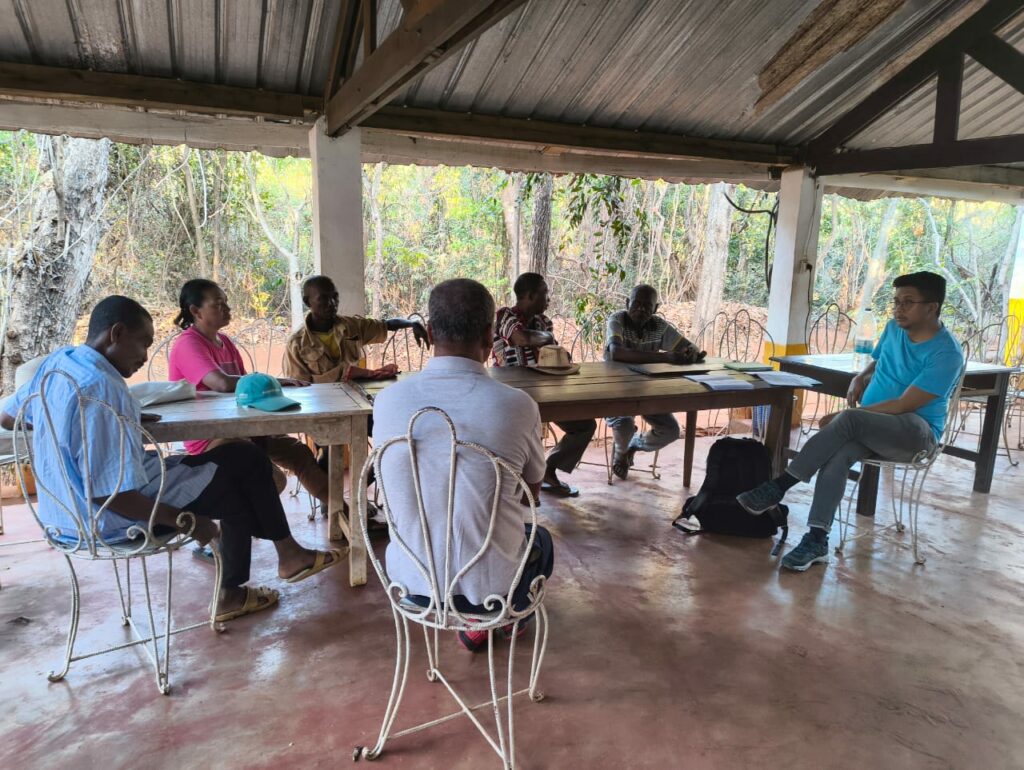With deep expertise in sustainable resource management and impact-driven investment, Blanda plays a key role in ensuring that every Mitsiry initiative creates measurable value for both people and nature. 🌍
In this interview, he shares his vision of how Mitsiry measures impact and the lessons he brings from his experience in Madagascar’s environmental sector
What does your role as Chief Impact Officer at the Mitsiry Climate Fund consist of?
As Chief Impact Officer, my role is to ensure that every company we invest in generates tangible benefits for both people and nature while managing environmental, social and governance (ESG) risks effectively.
Before each investment, I work closely with the company to identify key priorities, ensure alignment with the fund’s vision, and confirm that it operates responsibly and has the capacity to manage its impacts. Together, we then build an action plan to strengthen its practices and guide its sustainable growth.
After the investment, these plans are monitored regularly, and our team provides ongoing technical support and when needed, additional funding to help companies progress faster on key aspects.
Beyond compliance, my mission is to help entrepreneurs see impact as a real opportunity for growth and long-term value creation.
Can you tell us about your background – your studies and professional experience, and what led you to Mitsiry?
I am a forest engineer by training, specialized in sustainable management of natural resources. I studied at the School of Agronomy of Antananarivo (ESSA) in Madagascar, then completed a Master’s in Innovative Project Management at Université Senghor in Alexandria.
Before joining Mitsiry, I worked for several years at one of Madagascar’s largest responsible mining companies. There, I contributed to biodiversity offset programs and community-based conservation initiatives aligned with international standards. This experience taught me how to reconcile economic activity with biodiversity protection and local development.
Joining Mitsiry was a natural step forward, a way to apply that experience to impact investing and support local companies that combine business performance with positive outcomes for people and ecosystems.

How will you mesure impact for both communities and the environment?
At Mitsiry, impact measurement starts with collaboration. We work hand in hand with the companies we support, because reliable and useful data can only come from a shared understanding of why it matters.
Each enterprise co-develops its Theory of Change with our team to identify how our investment translates into tangible outcomes from improved livelihoods to restored ecosystems. Together, we define a baseline and set realistic targets. Companies then report data regularly, while we provide methodological support, verification, and technical assistance when needed. Our framework combines international standards with practical, context-based tools.
At fund level, Impact is tracked through five main indicators: jobs created or maintained, economic value generated, lives improved, surface under sustainable management, and carbon (tCO₂) sequestered or avoided.
For complex data such as carbon or biodiversity, our team can directly assist companies or engage external experts to ensure accuracy. The aim is simple: help entrepreneurs understand, measure, and enhance their positive contribution to society and the environment.
From your background and experience, what perspectives do you bring to addressing climate and development challenges in Madagascar?
After seven years working in conservation and with communities across Madagascar, I’ve learned that conservation only works when people’s well-being is at the center.
Protecting forests or biodiversity cannot succeed if local communities do not see clear, tangible benefits. Development and conservation must move together.That experience deeply shapes my perspective at Mitsiry. I strongly relate to the fund’s vision that true climate and biodiversity solutions must also create opportunities for income, stability, and dignity.
This shared belief is what drives my work today, supporting local small and medium-sized enterprises that combine economic growth with environmental restoration. By strengthening their resilience and that of the communities they work with, we contribute to a development model where people and nature thrive together.
Why is it crucial for Madagascar to have its own climate fund ?
Mitsiry’s Theory of Change is built on a simple but powerful idea: by providing financial and technical support to local small and medium-sized enterprises, we can create jobs and sustainable economic value — which in turn reduces poverty and the unsustainable exploitation of natural capital.
In Madagascar and across the South-West Indian Ocean region, where employment opportunities are scarce, households often depend on extractive practices just to survive. Supporting sustainable business models helps break this cycle by improving household incomes and strengthening resilience to climate, economic, and social shocks, while contributing to biodiversity conservation and climate mitigation.
Having a dedicated climate fund in Madagascar allows us to act directly where these dynamics play out — close to local realities, entrepreneurs, and ecosystems. While international initiatives remain key, a local fund ensures that climate finance is adapted to the context and that transformation comes from within.
